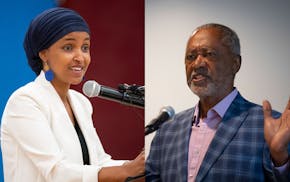Congress should be "significantly involved" in ensuring the passports of suspected Islamic State fighters are revoked, U.S. Senate candidate Mike McFadden said Monday, noting that the Twin Cities' Somali community remains vulnerable to terrorism recruitment efforts.
McFadden spoke just three days after federal authorities arrested 19-year old Mohammed Hamzah Khan at Chicago's O'Hare airport, alleging that he was headed to Iraq to fight for the ISIL terrorist group, but focused largely on the Twin Cities Somali community, where more than a dozen men and three women have left the United States to fight alongside or aid extremists in the Middle East and Africa. At least two Minnesotans have died in the fighting.
On Monday, he called for improving education and employment opportunities for the community, building mentorships and forming partnerships between communities and law enforcement. McFadden, who has held several meetings with the Somali community, said Somalis are scared.
"They're parents just like I am. They're very concerned about their kids,'' said the Republican challenger to Sen. Al Franken.
"What I don't want to do is wait until it's too late. The idea that there's Americans fighting with ISIS who continue to have their passports and have the capability to come back into the United States and perpetrate a terrorist attack is a huge issue," he said. "If they want to retrieve their passport, there would be a process to get that passport retrieved. They would be allowed to articulate why they're affiliating with that terrorist organization."
McFadden's plan echoes a bill introduced by U.S. Rep. Michele Bachmann, R-Minn., to revoke passport and re-entry privileges for American citizens who fight overseas for Islamic militants. The Terrorist Denaturalization and Passport Revocation Act rescinds re-entry privileges for people who join terrorist armies overseas.
Concern over Islamic extremists has become a flash point in the race between McFadden and Franken, with the challenger contending Franken hasn't done enough to combat terrorism.
Franken maintains he has been working on terror recruitment issues since 2009 and cites a recent letter he wrote to outgoing Attorney General Eric Holder, urging him to take more action regarding terror recruitment. The U.S. Justice Department recently announced a federal pilot program to take on terror recruiting, focused in part in the Twin Cities.
Franken spokeswoman Alexandra Fetissoff called McFadden's tactics "election year politics."
"The State Department already has the authority to revoke passports, and that is one important tool the government has to help stop terrorists," Fetissoff said. "We need to make sure we are using all of the tools at our disposal to stop members of ISIL from coming to the U.S. and harming our country."
Hashi Shafi, executive director of the Minneapolis-based Somali Action Alliance, also said McFadden's plan reflected the current election. He said the federal government already has procedures in place to prevent such travel.
"We don't want Congress to be involved at all," Shafi said. "Let that be the part of the Justice Department, and we have great judicial systems."
Shafi said the culture of the Somali community has changed since the first spate of recruitments by the Somali terrorist group Al Shabab in 2008-09.
"When those young men left, the lesson we learned was the community and law enforcement had no relationship," he said. "Now if a young man disappears the families ask for help from law enforcement. Those kinds of things never happened before."
Abby Simons • 651-925-5043

'Watching history happen': New Minnesota flag flies at Capitol

